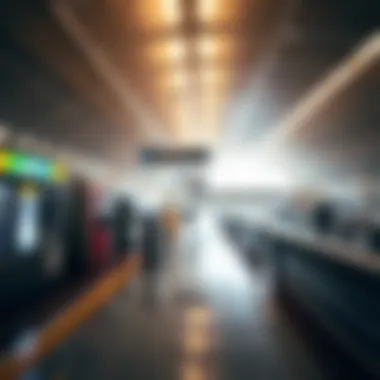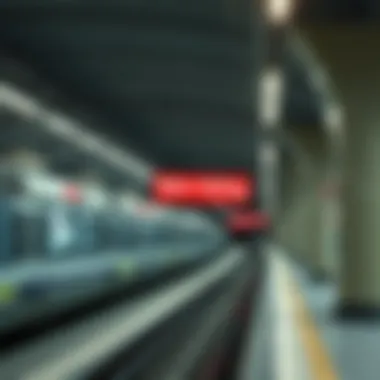Understanding Metro Station Closing Times in Dubai


Intro
Navigating the vast urban landscape of Dubai often hinges on the city's metro system. A marvel of modern engineering, the metro is an essential artery for residents, tourists, and commuters alike. Yet, understanding the closing times of metro stations goes beyond mere convenience; it intertwines with aspects of daily life and urban planning in this bustling city.
In the context of Dubai, where the pace of life seldom slows, the significance of timely metro access cannot be underestimated. Commuters rely on its operational hours to fit their schedules, while businesses and real estate investors are keenly aware of how these timings influence foot traffic and property desirability. As the city continues to expand, the implications of metro station hours will also evolve, making this topic worth diving into.
In this article, we’ll explore key insights into how metro closing times shape the wider landscape, touching on elements from market impacts to investment strategies. Through understanding these factors, we can glean a more comprehensive view of the interconnected nature of transport, property, and lifestyle in Dubai.
Intro to Metro Stations in Dubai
The metro system in Dubai is not just a mode of transportation; it serves as an artery that pumps life through the bustling city. The importance of understanding metro station closing times hinges on various factors that influence daily routines for thousands of residents and visitors alike. These hours dictate when the city’s veins start to pulse or wind down, impacting aspects such as employment, leisure activities, and even real estate value.
A well-timed metro ride can mean the difference between catching a concert at Dubai Marina or being stranded at a station, signaling the end of an outing. Knowing the ins and outs of the closing times helps commuters plan their travels, thus reducing stress and enhancing overall experience. Weaving together these schedules allows investors and homebuyers to guess traffic trends, which can be very vital in making decisions related to property.
Overview of Dubai's Metro System
Dubai's metro system is a modern marvel and a cornerstone of urban infrastructure. First operational in 2009, it has quickly earned a reputation as one of the most high-tech rail systems in the world. Spanning multiple lines across a sprawling urban landscape, the metro connects key financial districts, shopping hubs, residential areas, and tourist attractions.
The Red Line and Green Line are the two main routes, with the former serving as the backbone, linking the bustling areas from Rashidiya all the way to Jebel Ali. Meanwhile, the Green Line runs through central districts, making it essential for everyday commuters. Both lines are unique in design and operational execution. Their connectivity is crucial, often making them a go-to for the city's residents and tourists. This network plays a crucial role in Dubai’s economic landscape, assisting innumerable residents and visitors with their travel needs.
In essence, highlighting these connections and features enables a more in-depth understanding of the metro system's relevance in various spheres—from easing transportation woes to accelerating development in real estate.
Importance of Closing Times
Closing times of metro stations cannot be treated as trivial; they encapsulate a range of functions for different demographics. For commuters who rely on these services daily, knowing when the last train departs can significantly affect their productivity and quality of life.
"Metro closing hours define the boundary between work and leisure for countless Dubai residents."
Furthermore, these hours also have implications for local businesses and tourism. Restaurants and entertainment venues rely on the foot traffic generated by metro riders, especially in the evening. If the last train leaves too early, business owners might find themselves closing shop earlier, leading to a potential revenue loss.
On another front, closing times also impact real estate dynamics. Properties located within convenient access to metro stations may command higher prices, especially in relation to how late the last train runs. Investors and homebuyers need to understand these parameters when evaluating properties, as they can heavily influence the desirability of an area.
Standard Closing Times for Metro Stations
Understanding the standard closing times of metro stations in Dubai holds significance for a multitude of reasons. First and foremost, it influences the daily routines of commuters, whether they are residents or tourists. Each hour of operation—or lack thereof—shapes how individuals plan their day, from work to leisure activities. Additionally, these times create a framework for assessing the efficiency and reliability of public transport, an essential element in the metropolitan experience.
The importance of knowing when metro stations close extends beyond mere convenience. It plays a role in community safety, as people must ensure they can return home without having to rely on alternative transportation, which can be both time-consuming and costly. Furthermore, closing times can impact local businesses. Bars, restaurants, and retail shops often align their hours around metro schedules to cater to customers. Hence, adapting to these closing hours could affect their bottom line.
Consequently, navigating through the particulars of standard closing times informs commuters’ choices, influences economic cycles, and aids in urban planning.
Weekday Operations
Dubai's metro system operates under a schedule designed to accommodate the majority of its users on weekdays. The metro typically runs from 5:00 AM until midnight from Saturday to Wednesday, while Thursday sees extended hours, reaching a closing time of 1:00 AM. This arrangement is particularly beneficial for the working population who may need to access various business districts or commercial centers during peak hours. With the trains running frequently, every five minutes during rush hours, commuters enjoy a reliable way to reach their destinations without the worry of overcrowding or long waiting periods.
Weekdays in Dubai could be likened to a well-oiled machine, where the predictable metro hours allow individuals to optimize their travel plans. If there are unexpected delays or last-minute decisions, knowing the metro's schedule ensures that most can catch a ride home without too much hassle. Thus, understanding weekday operations is crucial for efficient time management for professionals and students alike.
Weekend and Holiday Hours
Metro operations on weekends and holidays reflect a slight shift in schedule, aligning more with leisure activities rather than the workweek grind. On Fridays, the metro opens later at 10:00 AM, catering to those who attend Friday prayers. The closing time on Friday is similar to weekdays, ending around 1:00 AM. On Saturdays and Sundays, the service typically runs from 6:00 AM to midnight, with holiday hours synchronizing similarly.
This arrangement emphasizes the importance of flexibility in public transportation, allowing families and tourists to explore Dubai's various attractions, shopping malls, and events without the constraint of early closing times. It encourages social interactions and promotes tourism, as more options come into play during these hours. However, adjustments are often necessary. If a major event occurs—like national holidays or festivals—the operational hours may fluctuate to accommodate increased passenger demand.
Understanding these weekend and holiday hours helps not just in personal planning but also supports businesses that thrive during leisure times. Knowing when transport is accessible can be the difference between hopping on a bus to the beach or getting stuck in a traffic jam trying to find parking.


Understanding the various metro closing times not only helps in planning but also encourages a vibrant social and economic atmosphere across Dubai.
For a deeper understanding of public transportation in Dubai, additional resources can be found on Wikipedia or the Roads and Transport Authority.
In summary, grasping the standard closing times of metro stations in Dubai allows commuters and local businesses to strategize effectively, leading to a seamless urban experience.
Factors Influencing Closing Times
Closing times for metro stations in Dubai aren't just arbitrary decisions; they are the result of various interconnected factors. Understanding these influences can help passengers, real estate professionals, and city planners make informed decisions that impact their daily lives and investments in the area. The way the metro is operated is closely aligned with the city's growth and operational demands.
Passenger Demand Patterns
Passenger demand is the heartbeat of any public transit system, and the Dubai Metro is no different. The closing times are largely dictated by the flow of passengers using the trains at different times of the day. For instance, during peak hours, particularly in the morning and early evening, the demand skyrockets.
In understanding this, metro authorities may adjust hours according to various patterns:
- Weekday vs. Weekend Use: Typically, weekdays see a significant surge in commuters heading to workplaces, leading to busier trains. Weekends, however, might attract fewer riders, which can influence shifts in operational hours.
- Cultural and Social Activities: Events such as concerts, festivals, or sports games can lead to spike in passengers. Knowing when these events happen can help the metro adapt by extending hours when necessary to facilitate transit for event-goers.
By monitoring these patterns, the Dubai Metro can ensure that its schedules meet the public's need for reliable, timely service.
Maintenance and Upgrades
Another crucial aspect affecting closing times is the necessary maintenance and upgrades of the metro system. Like any sophisticated transit infrastructure, the Dubai Metro requires regular upkeep to ensure safety and efficiency. Maintenance can be scheduled during hours when ridership is lowest, often meaning late night or early morning.
- Routine Maintenance: Regular checks and repairs ensure that all systems are functioning optimally; hence some stations may close earlier to facilitate these activities.
- Upgrades for Future Efficiency: Occasionally, more extensive upgrades lead to changes in service hours. When new technology is being integrated, or when expansions are underway, these efforts can necessitate temporary changes to closing times.
Notifying passengers through various channels about maintenance schedules ensures that commuters remain informed, helping to minimize disruptions.
Understanding factors like passenger demand and system maintenance provides a comprehensive overview of why metro stations operate within their current hours. For both daily commuters and investors in the real estate market, this knowledge can help navigate the dynamics of urban living in Dubai.
Metro Line Variations
The differences in closing times between various metro lines in Dubai are essential for understanding the broader implications on commuters and residents. Each line operates under slightly different schedules, influenced by factors including passenger demand, geographic coverage, and integration with other transit services. This variation can affect daily routines and could potentially create bottlenecks during peak hours.
Understanding these differences is crucial for a variety of stakeholders, such as investors, realtors, and homebuyers. Properties located near stations on lines with extended operational hours may hold more value due to the enhanced accessibility they offer, while those on lines with shorter hours might see a decrease in demand.
Red Line Closing Times
The Red Line, spanning from Rashidiya to UAE Exchange, is one of the busiest lines in the Dubai Metro network. During weekdays, the typical closing time is around midnight, allowing commuters adequate time to complete their journeys after a long day at work. The closure often reflects higher passenger traffic earlier in the day, leaving late-night operations to a minimum.
Extended hours on weekends can sometimes see a closing time pushed to 1 AM, catering to the nightlife scene which attracts many visitors and locals alike. This slight adjustment allows better access for those attending late-night events or simply enjoying the vibrant city.
Here are some considerations regarding the Red Line:
- Accessibility: With stops at key destinations like Dubai Mall and Marina, late hours are vital for both tourists and late-shifters.
- Impact on Real Estate: High foot traffic near Red Line stations often results in increased rental prices for properties.
- Potential Adjustments: Future evaluations may consider extending hours further as demand grows.
Green Line Closing Times
In contrast, the Green Line serves a different demographic and geographical area, linking key residential districts to commercial hubs. Closing times for the Green Line are generally accomplished by around 11 PM on weekdays, reflecting a smaller, yet still substantial, passenger base. Even though its operations finish earlier than the Red Line, it is essential for those navigating around neighborhoods like Deira and Bur Dubai.
On weekends, much like its counterpart, the Green Line also adjusts to cater to late-night users, pushing its closing time to midnight. This flexibility allows the line to remain relevant in a city where social events extend late into the night.
Factors associated with the Green Line include:


- Demographic Variance: Diverse ridership provides unique demands and operational challenges.
- Integration with Other Transit: Connections to buses and water taxis enhance the overall effectiveness of the commuting experience.
- Market Influence: Properties near Green Line stops often benefit from lower rents, presenting opportunities for investors seeking affordability.
Understanding these variations in closing times between the Red and Green Lines reveals not only the operational strategies of Dubai's metro system but also the far-reaching effects on real estate trends and commuter behaviors.
Impact on Commuters
The metro station closing times in Dubai are more than just numbers on a timetable; they weave into the very fabric of daily life for many residents and visitors. Understanding this impact is essential to grasping how effectively the metro system serves a bustling metropolis.
Planning Daily Routines
For countless commuters, the closing times dictate the rhythm of their days. From office workers to students, knowing when trains cease operations influences not only how they plan their travel but also their working hours and social engagements.
- Morning Commutes: Many people start their day early to catch the first metro trains. If someone has a meeting at 9 AM, they need to ensure they're at the station by around 8:00 AM to get to their destination on time. Delays can pile up quickly.
- Evening Departures: Conversely, if closing time is at midnight, it can allow for late-night activities or work shifts. However, arriving at a station close to closing can lead to panic or urgency, making the experience less enjoyable. Pre-planning can help but requires reliable information about the last trains.
- Social Gatherings: For social butterflies who enjoy Dubai's vibrant nightlife, metro hours might influence their choice of venues or activities. If someone knows they can't make the last train home, they might think twice about attending an event, ultimately impacting businesses reliant on foot traffic from commuters.
"The train waits for no one, but knowing the schedule can make all the difference between a smooth ride and a sprint to the station."
Last-Mile Connectivity Issues
In an ever-growing urban sprawl like Dubai, the metro offers convenience, yet the journey does not end at the station. Last-mile connectivity plays a significant role in the overall commuter experience. While the metro may bring passengers close to their destination, the question remains—how do they get the rest of the way?
- Availability of Taxis and Ride-Sharing: As metro closing times approach, the availability of taxis or ride-sharing services like Uber or Careem can become scarce. A commuter might find themselves abroad a deserted station after 11 PM, pondering how to reach their destination.
- Walking Distances: For those living near a station, the last stretch might simply involve a short walk. Yet in areas where distances are longer or safety is a concern, the closing hours could lead some to rethink their options, potentially opting for less cost-effective means, like traditional taxis, instead.
- State of Infrastructure: Additionally, the quality of surrounding infrastructure can significantly affect last-mile connectivity. Proper pedestrian pathways or bike lanes can bridge the gap between the station and commuters' final destinations, making the overall experience smoother.
In summary, closing times of metro stations in Dubai influence more than just when trains stop running. They play a crucial role in shaping daily routines and last-mile connectivity challenges for commuters, making it an important topic for discussion among investors, real estate professionals, and urban planners. Understanding these dynamics is key to finding opportunities in the market, be it for rentals or property acquisition.
For a deeper understanding of Dubai's urban transit solutions, you may visit resources such as Wikipedia and Britannica.
Real Estate Implications
The closing times of metro stations in Dubai wield significant influence over the real estate landscape. This relationship between transit availability and property values is not merely incidental; it’s crucial for investors, realtors, and homebuyers to appreciate how these times shape urban living. As the city continues to develop and evolve, the real estate market is responding to both the opportunities and limitations provided by metro operations.
Understanding the nuances of this topic is paramount for stakeholders aiming to make informed decisions. A station's proximity to residential areas, shopping districts, and business hubs can dictate the desirability of the surrounding properties. Moreover, the operational hours of these metro stations can either enhance or restrict accessibility, addressing the daily needs of residents and influencing their choice for living spaces.
Property Values Near Metro Stations
The correlation between metro stations and property values is a well-documented phenomenon in many urban centers, and Dubai is no exception. Properties located within a close range to metro stations typically command higher prices, largely due to the convenience factor that public transit provides.
Investors in Dubai have observed that neighborhoods like Dubai Marina or Jumeirah Lakes Towers benefit from a metro line nearby, drawing interest from both local and foreign buyers. People looking for easy commutes and access to entertainment or employment are often willing to pay a premium for homes near transit.
- Connectivity: Residents value convenient access to major commercial centers.
- Demand Surge: As metro accessibility improves, demand for nearby properties generally increases.
- Rental Yield: Properties close to metro stations tend to enjoy higher rental yields, making them attractive to landlords.
However, it’s also vital to consider that not all metro stations have the same impact on property values. Some areas may experience a dwindling potential due to noise, traffic congestion, or limited parking, which can drive potential buyers away.
Investment Trends Impacted by Transit Hours
The hours of operation for metro services can drastically impact investment trends. When metro stations operate late into the night, it not only extends commuting options for workers but also enhances the attractiveness of surrounding properties for both residential and commercial purposes.
Investments in commercial real estate, in particular, benefit from the extended hours of transit. Businesses such as cafes, restaurants, and convenience stores see increased foot traffic, particularly in active metro areas. This leads to a robust business environment, attracting investors looking to capitalize on bustling locations. Conversely, properties near stations with limited hours may struggle to maintain consistent appeal.
- Flexible Work Hours: As many companies shift to more flexible working hours, extending metro service hours may cater to the workforce, thus elevating surrounding property investments.
- Planning Regulations: Real estate developers must contemplate how transit hours play into zoning restrictions or community plans when proposing new projects.
"Investors looking at the Dubai real estate landscape must evaluate the nexus of metro accessibility and market value, always recognizing that timings can shape trends dramatically."
In summary, the interplay between metro station closing times and real estate dynamics presents a complex yet rewarding topic. A keen understanding of these implications will allow REALTORS to better serve their clients, ensuring investors recognize the true potential of properties influenced by the shadows of the metro network.


Public Feedback and Needs
Public feedback regarding metro station closing times is essential for understanding the commuting landscape in Dubai. This section delves into how local opinions shape metro operations and the broader transportation network. Commuters have unique insights that can influence decisions and adaptations in service schedules. Addressing these needs not only fosters a sense of community but also enhances the efficiency of the metro system, ultimately benefiting all users.
Surveys on Commuter Preferences
Surveys are invaluable tools for gathering input from the general public, revealing how closing times impact their daily routines. Regular assessments can identify peak usage times and highlight when the metro is most needed. For instance, many commuters might suggest extending service hours later into the night, especially on weekends, to accommodate social activities or late-night work shifts.
A recent survey indicated that 65% of respondents favored extended hours on Fridays and Saturdays, reflecting the city's vibrant nightlife. Surveys also shed light on the preferences for different lines, suggesting that closing times may need tailor-making based on local demands. Implementing feedback from these surveys aligns operations more closely with actual commuter needs, resulting in more satisfied passengers.
Community Engagement Efforts
Alongside formal surveys, community engagement initiatives play a pivotal role in gauging public sentiment. Town hall meetings and workshops can facilitate open discussions between metro authorities and the public. These gatherings provide a platform for residents to voice their suggestions directly, fostering a participatory approach to urban transport.
Moreover, social media platforms are vital avenues for engagement. The Dubai Metro often monitors platforms such as Facebook and Twitter, addressing concerns and soliciting opinions from users. For example, a user feedback campaign launched on these channels resulted in numerous suggestions regarding the frequency of trains and adjustments in closing times.
The insights gained from these community-driven efforts lead to actionable improvements that cater to residents' changing lifestyles.
"Active communication between metro authorities and the public results in a transportation system that feels less mechanical and more human-centered."
By leveraging both surveys and direct engagement, metro authorities in Dubai can create a responsive transit model. This ensures that the needs of commuters are heard and acted upon, reflecting a commitment to public service and sustainable urban development. Consequently, integrating feedback into operational strategy may not only address current concerns but may also pave the way for future enhancements in the metro system.
Future Considerations
As Dubai continues to expand both in its physical layout and its population, the need to rethink metro station hours becomes apparent. Future considerations regarding these operational hours are significant. They represent a broader theme of accommodating the evolving lifestyles of residents and tourists alike. An understanding of these possible extensions and technological enhancements can help shape an even more efficient public transportation system.
Potential Extensions of Service Hours
One of the primary discussions in future planning is extending service hours. This step could greatly benefit the late-night commuters and shift workers who rely on the metro system. If the metro system were to operate beyond the current closing times, several community aspects might flourish:
- Greater Accessibility: More residents would be able to commute safely at all hours, thus reducing reliance on costly taxi services.
- Tourism Boost: With longer metro availability, tourists can explore nightlife and key destinations after sunset, potentially increasing revenue for local businesses.
- Employment Opportunities: More flexible transport options might attract businesses considering late-shift operations, supporting a wider array of jobs for residents.
Despite the potential upside, extending operating hours comes with challenges such as increased operational costs and the necessity for additional staffing. These should be carefully analyzed to ensure a balanced approach.
Technological Innovations in Metro Operations
The future of the Dubai metro system also hinges on technological innovations. New technologies can optimize not just the current operations but also provide insights into better meeting commuter needs. Some areas to consider include:
- Smart Ticketing Systems: Integrating contactless payment options can streamline user experiences, reduce waiting time, and ultimately encourage more frequent usage of public transport.
- Real-Time Updates: Innovations in communication can yield real-time updates on train schedules, delays, or service interruptions, enhancing the overall commuter experience.
- AI-Powered Analytics: Leveraging artificial intelligence to analyze commuter patterns can help administrators make data-driven decisions about service adjustments or potential expansions.
Incorporating new technologies is not just about making the metro service more efficient; it’s about aligning with the today’s fast-paced lifestyle where convenience is king.
Investing in these areas delivers more than just technological upgrades; it promises a holistic enhancement of daily commutes in Dubai, ensuring that the metro remains a cornerstone of the city’s infrastructure for years to come.
Culmination
Closing times of metro stations in Dubai play a vital role not just in daily commuting but also in shaping how the vibrant city flows. The specific hours during which these transport hubs operate significantly affect the routines and habits of residents and visitors. Understanding these times can empower commuters to make better travel decisions, ensuring they align their schedules to avoid the stress of last-minute rushes.
Summarizing the Importance of Closing Times
When examining the detailed implications of metro station closing times, several key elements emerge:
- Commuter Convenience: Travelers depend on predictable transit schedules for effective planning. Knowing when the last train departs can save one from a scramble to catch it or the difficulties of finding alternate transport in the late hours.
- Real Estate Value: Properties situated near metro stations often see fluctuations in value based on operational hours. Areas with extended service hours tend to attract more potential buyers and renters, reflecting a demand for convenience in urban living.
- Urban Planning Synergies: Metro closing times impact how urban planners design communities. Longer operational hours may encourage residential and commercial developments in previously undervalued areas, spurring economic growth and urban revitalization.
- Safety and Security: The hours during which the metro operates can also relate to passenger safety. Late-night users require additional consideration in terms of security measures at and around metro stations.
"The convenience of metro service hours isn't just about transit; it shapes the very fabric of urban life."
In the broader scope of urban infrastructure, the significance of metro station closing times cannot be overstated. As the demand for efficient public transportation continues to rise, so too does the imperative for the Dubai metro system to adapt and evolve. Future considerations regarding potential extensions of service hours and advancements in technology will further redefine the commuting landscape, ensuring that this metropolis continues to thrive amidst rapid growth.
Understanding these dynamics equips investors, realtors, and potential homebuyers with the insight needed to navigate this bustling city effectively, making informed decisions that positively influence their journeys through Dubai.











